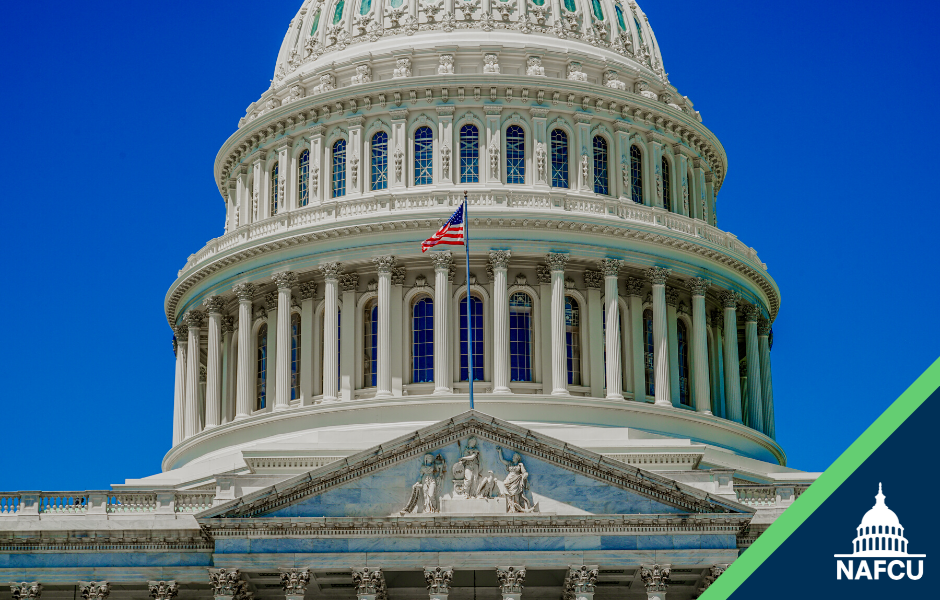Newsroom
NAFCU’s legislative team engaged on bank failures, small biz, interchange
 NAFCU’s Legislative Affairs Team is active on Capitol Hill this week, monitoring discussions stemming from recent bank failures for potential impacts on credit unions and the broader financial system, as well as hearings with the Small Business Administration (SBA). The team provided an update to NAFCU members on these issues and more during the association’s Legislative Committee meeting Tuesday.
NAFCU’s Legislative Affairs Team is active on Capitol Hill this week, monitoring discussions stemming from recent bank failures for potential impacts on credit unions and the broader financial system, as well as hearings with the Small Business Administration (SBA). The team provided an update to NAFCU members on these issues and more during the association’s Legislative Committee meeting Tuesday.
Bank failures
Of note, the Senate Banking Committee announced it will hold a hearing on the Silicon Valley Bank and Signature Bank collapses Tuesday, ahead of the House Financial Services Committee’s hearing the next day. Federal Deposit Insurance Corporation (FDIC) Chair Martin Gruenberg, Federal Reserve Vice Chair of Supervision Michael Barr, and Treasury Department Under Secretary for Domestic Finance Nellie Liang are expected to testify at both.
House Financial Services Committee Chairman Patrick McHenry, R-N.C., has joined with committee Ranking Member Maxine Waters, D-Calif., and Senate Banking Committee Ranking Member Tim Scott, R-S.C., to obtain information from the Fed on its supervision of the failed banks and to call for investigations into why they happened.
During Tuesday’s Legislative Committee meeting, NAFCU shared updates on deposit insurance reform efforts; it is expected that next week’s hearings will explore raising the deposit insurance threshold above $250,000. NAFCU has flagged that 90 percent of credit union deposits are insured, compared to roughly 50 percent of bank deposits. NAFCU will continue to reiterate to lawmakers and regulators that these were not systemic issues and that the credit union industry remains strong.
SBA hearing
Ahead of today’s SBA budget and oversight hearing in the Senate Small Business Committee, NAFCU Vice President of Legislative Affairs Brad Thaler sent a letter reiterating NAFCU’s call for a level playing field with fintechs, highlighting the association’s concerns with recent SBA proposals to loosen lending requirements and open SBA loan programs to fintech lenders.
Thaler touted credit unions’ “efforts to increase access to personal and small business financial services for underserved communities” and noted that the industry’s overall business lending portfolio has grown by more than 20 percent over the past year, consistent with the growth seen over the past five years. NAFCU will monitor today’s hearing, as well as tomorrow’s in the House Small Business Committee, and provide credit unions with insights.
Relatedly, NAFCU’s Legislative Committee discussed implications the CFPB’s section 1071 proposal, which is related to small business lending data collection. NAFCU’s comment and a joint trades letter urged significant changes to the proposed rule to reduce compliance burdens imposed on credit unions.
Interchange
NAFCU also provided Legislative Committee members with an update on interchange efforts and the potential reintroduction of the Credit Card Competition Act (CCCA). Thaler sent a message to member credit unions Monday, urging them to contact their senators in opposition of the legislation. NAFCU’s advocacy efforts successfully kept the CCCA from passing last year; credit unions can find resources to bolster NAFCU’s advocacy through the Grassroots Action Center. NAFCU also encourages credit unions to share a statement that the association can publicly use with media, members of Congress, and others to oppose this bad policy.
Share This
Related Resources
Add to Calendar 2024-06-26 14:00:00 2024-06-26 14:00:00 Gallagher Executive Compensation and Benefits Survey About the Webinar The webinar will share trends in executive pay increases, annual bonuses, and nonqualified benefit plans. Learn how to use the data charts as well as make this data actionable in order to improve your retention strategy. You’ll hear directly from the survey project manager on how to maximize the data points to gain a competitive edge in the market. Key findings on: Total compensation by asset size Nonqualified benefit plans Bonus targets and metrics Prerequisites Demographics Board expenses Watch On-Demand Web NAFCU digital@nafcu.org America/New_York public
Gallagher Executive Compensation and Benefits Survey
preferred partner
Gallagher
Webinar
Add to Calendar 2024-06-21 09:00:00 2024-06-21 09:00:00 The Evolving Role of the CISO in Credit Unions Listen On: Key Takeaways: [01:30] Being able to properly implement risk management decisions, especially in the cyber age we live in, is incredibly important so CISOs have a lot of challenges here. [02:27] Having a leader who can really communicate cyber risks and understand how ready that institution is to deal with cyber events is incredibly important. [05:36] We need to be talking about risk openly. We need to be documenting and really understanding what remediating risk looks like and how you do that strategically. [16:38] Governance, risk, compliance, and adherence to regulatory controls are all being looked at much more closely. You are also seeing other technology that is coming into the fold directly responsible for helping CISOs navigate those waters. [18:28] The reaction from the governing bodies is directly related to the needs of the position. They’re trying to help make sure that we are positioned in a way that gets us the most possibility of success, maturing our postures and protecting the institutions. Web NAFCU digital@nafcu.org America/New_York public
The Evolving Role of the CISO in Credit Unions
preferred partner
DefenseStorm
Podcast
AI in Action: Redefining Disaster Preparedness and Financial Security
Strategy
preferred partner
Allied Solutions
Blog Post
Get daily updates.
Subscribe to NAFCU today.
